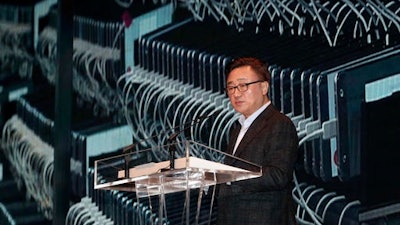
SEOUL, South Korea (AP) — Samsung Electronics says flaws in the design and production of batteries used in its Galaxy Note 7 smartphone, not its hardware or software, made it prone to catch fire.
Samsung said Monday that it was responsible for not ensuring the design specifications given to its suppliers were failsafe but believed its investigation into the problem would help the entire industry counter overheating risks with lithium batteries. Analysts questioned if the world's largest smartphone maker had really gotten to the bottom of the problem.
The South Korean company delayed the launch of its next Galaxy phone —the Galaxy S8, which usually would come in February. It also announced tighter quality controls and more rigorous testing to ensure safety.
During a two-hour press conference livestreamed in English, Chinese and Korean, Samsung said tests of more than 200,000 phones and 30,000 batteries showed different problems with each of the two kinds of batteries used in the Note 7.
Some experts had speculated that the phones' ultra-thin design or water-resistant features could have made them prone to overheat. Koh Dong-jin, president of Samsung's mobile division, said the investigation found no such problems.
The Galaxy Note 7 featured one of the biggest battery capacities so far for smartphones at 3,500 mAh, or milliampere hour, which gave it the highest energy density of all Samsung's devices. However, Koh said Samsung and outside inspectors found no evidence that the high energy density alone was to blame.
Samsung introduced the Note 7 on Aug. 2 and weeks later recalled the first batch after reports emerged that the phones were overheating and in some cases exploding. After replacement phones also started catching fire, aviation authorities banned them on flights and the company dropped the product for good. It has estimated the quality control fiasco will cost it $5.3 billion through early this year.
The Note 7 isn't the only gadget to catch fire thanks to lithium battery problems, which have afflicted everything from laptops to Tesla cars to Boeing's 787 jetliner. Manufacturers like the batteries because they weigh less and pack much more energy into the same space than other types of batteries.
But rechargeable lithium batteries like those used in smartphones are more susceptible to overheating than other types of batteries if they are exposed to high temperatures, are damaged or have manufacturing flaws.
Having taken heat for failing to fix the problem after the first Note 7 recall in September, Samsung brought in three private inspectors to help. U.S. companies UL and Exponent examined batteries from Samsung's suppliers Samsung SDI and Amperex Technology Ltd., or ATL. The German company TUV Rheinland analyzed the Note 7 supply chain as part of the investigation.
Inspectors found damage to the upper corners of batteries made by one manufacturer — likely Samsung SDI — and used in the initial batches of Note 7s.
That, combined with overly thin separators and high energy density, caused the phones to overheat, Samsung said. The cell-pouch design of the battery also did not have enough space to safely accommodate its electrodes — another flaw.
In other batches of batteries from a second manufacturer, presumably China-based ATL, used in replacements for the recalled smartphones the researchers found welding defects and a lack of protective tape in some battery cells.
Patrick Moorhead, president of Moor Insights & Strategy, said the odds of two different suppliers having issues with the same phone are extremely low.
The case "may signal we may have reached an inflection point in smartphone battery technology," Moorhead said.
Samsung's latest findings were not that different from the ones announced after the first Note 7 recall, said Park Chul Wan, a former director of the next generation battery research center at the state-owned Korea Electronics Technology Institute.
"Samsung said the weaknesses could make the phone prone to catch fire. That I understand but what did trigger fires in such conditions? Did they discuss if there is another cause? No," said Park of the Korea Electronics Technology Institute.
Though Samsung faulted the batteries from its suppliers, it said it would bear all costs from the Galaxy Note 7 debacle.
"We are taking responsibility for our failure to ultimately identify and verify the issues arising out of battery design and manufacturing," it said in a statement.
It was unclear to what extent the battery makers were responsible for those problems since Samsung said only that it had provided "targets," such as how thin the batteries should be and what their capacity should be. That may suggest a breakdown both in communication between Samsung and its suppliers and in quality control and testing.
"We suggested that the Note 7 has innovations and a compact design and a 3500 mAh (battery) but we did not know how to make the separators within (the battery) or how many millimeters thick they should be," Koh told reporters.
He said Samsung would use what it learned from its investigations to improve lithium battery safety for the industry.
To avoid further problems, Samsung said it was introducing an 8-point battery safety check with more intense durability tests; a new test on accelerated usage and a charge and discharge test. The tighter safety measures will be implemented in "every element of the company's devices," it said, including overall design and materials used.
Samsung said it also will seek advice on battery safety and innovation from a group of battery experts.
The company has recalled 3.06 million Note 7 phones. About 4 percent, or 120,000 units, of the recalled Galaxy Note 7s have not been returned.






















